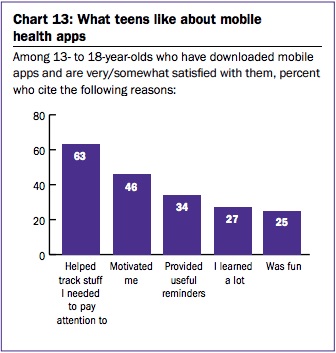 A new survey of more than 1,500 teenagers in the US by the Center on Media and Human Development at Northwestern University shows that a majority of teenagers go online to look for health information, though considerably fewer use digital health tools or wearables.
A new survey of more than 1,500 teenagers in the US by the Center on Media and Human Development at Northwestern University shows that a majority of teenagers go online to look for health information, though considerably fewer use digital health tools or wearables.
According to the survey, 84 percent of teens have gotten health information online. Twenty-five percent say say they have gotten “a lot” of health information online, compared to 10 percent who say they've gotten "a lot" of health information from books, 9 percent from TV news, 4 percent from radio, 3 percent from newspapers, and 3 percent from magazines.
By contrast, only 25 percent have used digital health tools (defined as health-related apps, mobile games, and wearables). The vast majority of those (21 percent of the total group) had used health-related apps, 12 percent had played health-related digital games, and 7 percent had used a wearable health device. The most popular use cases for health apps were exercise and nutrition. Among smartphone-owning teens, 22 percent have downloaded an exercise app, and 13 percent have downloaded a nutrition or calorie app.
"Although 21 percent of all teens have downloaded a health-related mobile app, far fewer actually use them," the survey authors wrote in the report. "Among those who have downloaded a health-related app, almost half (47 percent) hardly ever or never use them, another 45 percent sometimes use them, and 8 percent often use them. (Among all teens, 10 percent hardly ever or never use their health-related mobile apps, 10 percent sometimes use them, and 2 percent often use them.)"
The report also included quotes from anonymous focus group members. One quote from an 11th grade girl gives some insight into the teen market for wearable activity trackers.
"I got the Fitbit for Christmas and wore it for a while and the bracelet fit my wrist weird and hurt," she said. "I was like forget it and then I stopped using it. Also it’s not cute and it’s just kind of weird and mostly males use it. All my friends’ dads have it and I’m like thank God I don’t wear that anymore.”
In total, 32 percent of teens said that they've changed their behaviors as a result of digital or online health tools. But 28 percent attributed behavior change to online health information. Only 7 percent credit an app, 2 percent games, and 1 percent credit wearables for their behavior changes.
The study showed that teens are most likely to search for online health information for a school project (53 percent cite that as their reason).
After school projects, 45 percent proactively search for good health tips, 35 percent search for symptoms in response to a health issue, 27 percent search to learn about a friend or family member's health issue, and 24 percent search for treatments for an injury or illness. Only 13 percent said they used the internet to search for topics they were uncomfortable talking to their parents about.
In terms of topics, after exercise (42 percent), diet and nutrition was the most popular with 36 percent searching for information on it. Stress and anxiety polled 19 percent, followed by STDs and puberty each at 18 percent, depression and mental health tied with sleep at 16 percent, and colds, drug and alcohol abuse, and hygiene at 12 percent each.
Most teens (88 percent) said they wouldn't ask a health question on Facebook or Twitter, and only 10 percent said they got a lot of health info from social media. Instead, of those who look for health information online, 58 percent said they start at Google and 14 percent start at another search engine. Fifty percent then click on the first site that comes up
Eighty-two percent of teens said they were satisfied with what they find online. But only 24 percent are very satisfied compared to 57 percent that are very satisfied with information from their parents, 54 percent from health providers, or 38 percent from health classes at school. The top reasons for dissatisfaction with online health information were too much conflicting information (42 percent), the information didn’t appear reliable (40 percent), or the information found wasn’t relevant to their particular situation (35 percent).



















